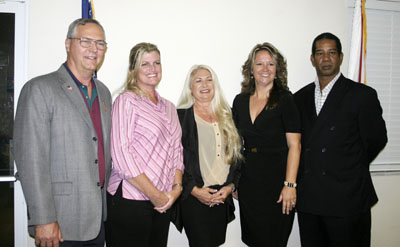Indian Trail Improvement District supervisors gave reports Wednesday on their March 4-8 trip to Tallahassee for Palm Beach County Days.
ITID President Jennifer Hager said it had been her first trip to Tallahassee for Palm Beach County Days, and she was not satisfied with the format.
“Scheduled appointments, in my opinion, were made with the wrong people,” Hager said. “I feel like our district suffered greatly with [Tropical Storm] Isaac. I don’t think I need to go talk to anybody in Tallahassee about special districts or parks or State Road 7 or any such things except not flooding ever again. Nothing about drainage was on anything for me to see anybody about.”
Hager asked who made the Tallahassee itinerary, and District Administrator Tanya Quickel said the items listed were decided by a task force and approved by a majority of the board.
“There are still active items that are being considered as well,” Quickel said. “The governor has $8.3 million for the Corbett levee in his budget, and that was discussed with all of the people that we had appointments established with.”
Hager said she agreed that the $8.3 million was important, but that Corbett belonged to the state, not the district. “It doesn’t belong to us; it doesn’t belong to Palm Beach County,” she said.
Quickel replied that the existing Corbett berm at the MO Canal is in Indian Trail’s easement, and the new berm will be built on Corbett land because there is no room elsewhere.
“I’m just saying that the governor should be doing that anyway,” Hager explained. “I don’t want to be doing any more back flips over the berm. That’s wonderful that we’re doing that, but I feel like we all should have been there pleading for drainage, and no one went there to do that. I don’t understand.”
“I respectfully disagree with that statement,” Quickel said.
Supervisor Michelle Damone said the local delegation supported the $8.3 million for the berm proposed in the governor’s budget, which has not yet been approved. “The local delegation met here in Palm Beach County prior to the legislative session,” she said. “Everyone had the opportunity to speak about legislation to a legislator from our area.”
Damone said she had met with legislators to ask them to follow the $8.3 million through the session. “I did that while I was in Tallahassee because that is part of the overall experience of Isaac,” she said. “We have lots of approaches and lots of opportunities we need to tackle to get better drainage for our community.”
Hager said she was disappointed because she had to explain what a special district was to some of the people she was scheduled to meet with. “There are five people on here for transportation. Three are new, and I had to explain to them,” Hager said. “I don’t think I need to go to Tallahassee to explain what a special district is.”
Damone said there are new Florida Department of Transportation people every time the governor changes, and there are issues that he and his staff are not familiar with that need to be explained.
Hager said she did not understand why she was scheduled to meet with legislators from out of the area who did not appear to be relevant, but Damone explained that they sit on committees that local bills would pass through for approval before they get to the floor.
Supervisor Ralph Bair said some of the people he spoke with knew nothing about special districts — only what they had heard from the governor. “We had to explain to them exactly what we took care of — roads, drainage, recreation — whatever it was to make sure, that number-one, we stay alive as far as a district goes, because we serve the people here,” Bair said. “We are the local government, and we made them understand that.”
Damone noted that Senate Bill 538, which would make special districts dependent on a local general-purpose government, such as the county, is detrimental to all special districts, yet it passed through the State Senate while they were there. She spoke with several senators, including the sponsor, explaining what the Indian Trail Improvement District was.
“I gave them our handouts and maps that Tanya provided in each of our packages so that they would know that we are a healthy, vibrant special district serving 39,000 people, and I gave them the characteristics of our community,” she said. “That bill is something we need to watch.”
Damone said part of the problem was that the supervisors did not work as a team in Tallahassee. “I tackled the job as best I could, but we normally work as a team,” she said.
In other business, the board denied the county’s application for a special permit to build a new driveway to its Mecca Repump Station because it would be rerouting traffic including 18-wheelers through a residential neighborhood.
The Mecca Repump Station driveway currently runs north to the unpaved right of way for Seminole Pratt Whitney Road, and the county asked to reroute it south across a canal to 100th Lane North about 90 feet west of Grapeview Blvd.
Engineer Rebecca Travis, representing the county, said the driveway is needed because the current driveway will be abandoned when the Mecca property is sold to the South Florida Water Management District. After hearing several residents, including many who live in the vicinity, speak against the proposal, Damone made a motion to deny the permit, which carried unanimously.
ABOVE: The Indian Trail Improvement District Board of Supervisors.








